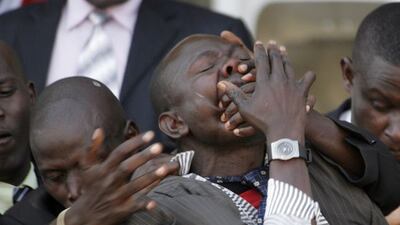NAIROBI // Kenyan journalists in the past two weeks have appeared at government press conferences with their mouths taped shut, their cameras at their sides and their notebooks in their pockets. Some have made less silent protests, disrupting a president's speech and getting arrested. The journalists have been demonstrating against a media bill the president, Mwai Kibaki, signed into law on the second day of the year giving Nairobi great powers to control and silence the media. Analysts said the new law is a step backwards for Kenya, which has made much progress to establish a free press. It is also seen as driving a wedge in the country's coalition government.
The Kenyan Communications Amendment Bill gives the government the power to raid media houses, seize broadcasting equipment and control content on the airwaves. It also gives postal officials the authority to open Kenyans' mail and impose fines on people who send letters deemed offensive. "Nothing is more dangerous to a free and independent press than legislation specifically created to provide for political control," The Nation, a leading Kenyan newspaper, wrote in an editorial. "The Kenyan media have been united against the offensive clauses, and they must not let up even if they have been passed into law." Mr Kibaki agreed last week to review the bill amid the public outcry. He has said the bill is in the best interest of the safety of Kenyans.
"I wish to appeal to the media to recognise that freedom must go hand in hand with responsibility," Mr Kibaki wrote in a paid newspaper advertisement. "Press freedom must be counterbalanced with other freedoms and must at all times take into account the overriding interest and the safety of Kenyans." During violence that erupted after last year's presidential elections, the government issued emergency orders to suspend live broadcasts. These measures, along with the new media "gag" law, have dropped Kenya 19 places to 97th in Reporters Without Borders' annual freedom of the press index. The Paris-based media watchdog called Kenya's media law "draconian".
"This is a major step backwards in the history of press freedom in Kenya," the organisation said in a statement. "We do not understand President Kibaki's decision, which will seriously undermine civil liberties in his country." Over the past decade, Kenya has been seen as having one of the most vibrant free presses in Africa, where such countries as Zimbabwe and Eritrea have set the bar low for media freedoms. Kenyan journalists have helped root out corruption in government including uncovering the Goldenberg scandal, when the country lost US$1 billion (Dh3.67bn) in a fraudulent gold export scheme in the 1990s.
"The passage of the Media Bill runs counter to the coalition government's commitment to carry out fundamental reforms in order to strengthen democratic institutions and to promote the well-being of all Kenyans," the US Embassy in Nairobi said in a statement. "As drafted, it is a step backwards, and not a step towards the brighter future that Kenyans want their leaders to pursue." Kenya formed a coalition government after two months of clashes over the disputed election last year. But the government of national unity has been strained recently and the controversial media bill has further polarised the two parties in the coalition nearly a year after rival politicians agreed to share power. Mr Kibaki's Party of National Unity has supported the media bill, but the former opposition Orange Democratic Movement (ODM) party has called for the law to be repealed. "There are clauses in this bill that defeat the basis of a free society," Musalia Mudavadi, the deputy prime minister and member of the ODM party, said at a press conference last week. "The Kenyan Communications Act is a draconian piece of legislation that is retracing our steps to the bad days that we do not want to remember," said James Orengo, an ODM member of parliament. Raila Odinga, the prime minister and leader of the ODM party, held crisis talks with leaders of his party last week on the status of the unravelling coalition. Mr Odinga believes he is being sidelined by the president. Besides the media law, the two main parties have been at odds over appointments to government positions and a claim that an illegal maize trading scheme has caused a food crisis in Kenya. Members of the president's party have accused members of the opposition party of selling maize outside of the country at a profit. The government has said that 10 million Kenyans are at risk of food shortages. mbrown@thenational.ae

